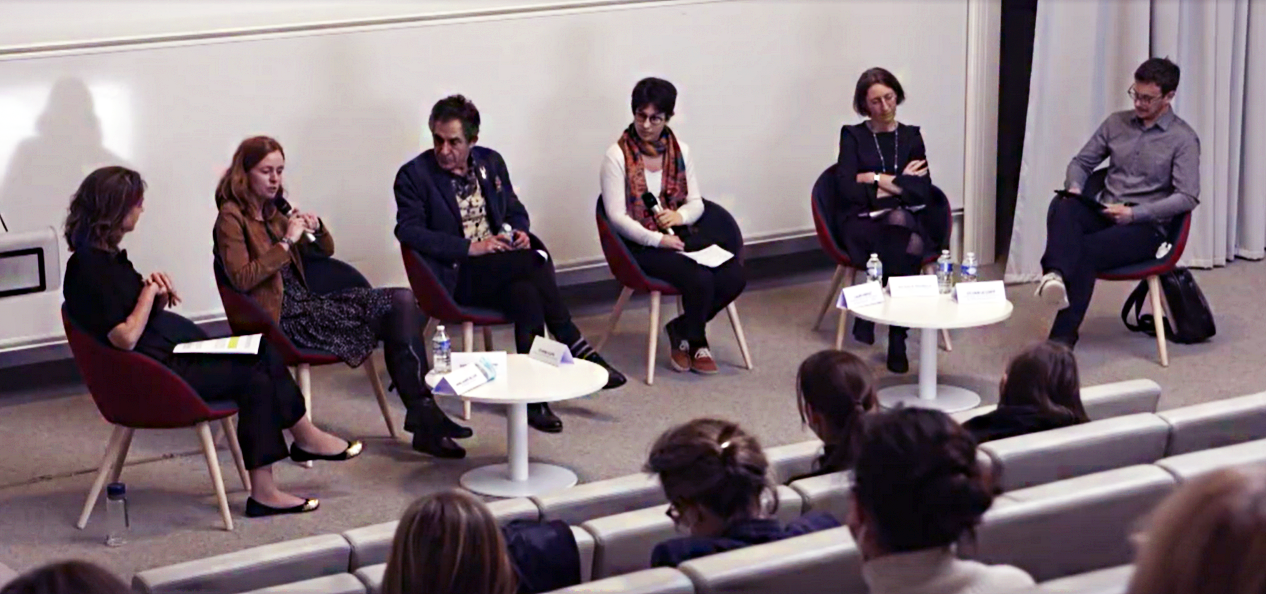
Rexel – Hi! Paris: Can AI help promote gender diversity in science?
To ensure equal access and participation in science and promote gender equality and girls’ independence, the United Nations created the International Day of Women and Girls in Science in 2015. Now, February 11th of each year celebrates equality, diversity, and inclusion. Rexel recently took part in this initiative to continue to inspire and involve more women and girls in science.
For the 7th International Day of Women and Girls in Science, Hi! Paris, an interdisciplinary research center created by the Institut Polytechnique de Paris and HEC Paris, and of which Rexel is one of the five founding members, held a round table on the theme “AI: A lever for promoting gender diversity in science?”. As part of this discussion, Constance Grisoni, Group Strategy Director at Rexel, shared her views and experience on the issue alongside physicist and philosopher of science Etienne Klein, Nathalie Brunelle, Project Director & President of TWICE at TotalEnergies, and Laure Prétet, PhD from the Institut Polytechnique de Paris (Télécom Paris). The round table was moderated by Anne Laure Sellier, Professor at HEC Paris, and Sylvain Le Corff, Professor at the Institut Polytechnique de Paris (Télécom SudParis). A look back on these discussions on the representation of women in scientific professions and the measures put in place in the corporate world as well as in the academic world to change the situation.
Rexel and Hi! Paris, committed to more gender diversity in science
This meeting marked a further step in the shared reflection on artificial intelligence (AI) and its relationship in relation to the place of women in both the academic and business worlds. The first exchanges made it clear that women are under-represented in science and even more so in the highest management positions. While this conclusion is nothing new, it seems to have left a few scars, as Anne Laure Sellier, Professor at HEC Paris, highlights, reminding us that there are fewer women in the IT sector today than in the 1980s. Today, less than a quarter of engineers in France are women. While they account for 57% of higher education graduates, they account for only 25% of graduates in digital fields, and only 13% of them work in the digital field.
This is why the schools that are part of the Hi! Paris center are taking action by educating women and men on the immense potential of AI and raising their awareness on the social issues that continue to contribute to the “glass ceiling”. The emergence of mixed-gender teams is a major avenue to promote gender equality. For example, at Rexel, “We don’t necessarily have a uniform approach”, says Constance Grisoni, who contributes to the Group’s gender mix as part of the Wire (Women in Rexel) program, which aims to build networks across the Group’s countries to promote diversity, equality, and inclusion. “We have networks that take different forms depending on the country or functional department,” allowing local initiatives to develop with encouragement from the Group.
While at first glance AI may be considered as a scientific discipline, it is clear that it is spreading to all (or nearly all) sectors in the professional world. This is an additional opportunity to involve people with different backgrounds and skills on different projects. “At Rexel, this is what we have tried to do, and it works quite well because people want to work with artificial intelligence. They want to learn even if they don’t have the ‘classic’ academic background,” says Constance Grisoni, who adds that “It’s also an opportunity, because, to have a critical mind, you need to have several points of view, to challenge yourself and to debate”. In short, the diversity of profiles and skills, especially in the field of AI, is a catalyst for creativity. This is a reflection that can be transposed to the academic world, which still has work to do to inspire and encourage females to pursue careers in scientific fields.
From awareness to emulation: Emergence of an inclusive, collective consciousness
The discussion did not fail to recall the important role of inspirational figures in scientific disciplines. Examples of women in professional or academic careers are important vectors of identification and upward mobility and have a significant impact on how women’s place and legitimacy in scientific fields are represented, even years later. For Constance Grisoni, being a woman in a very masculine environment is a real driving force: Bringing a different way of thinking to the table than men offers new challenges and enriches the conversation.
By expanding the Wire network in different departments and countries, Rexel is also leveraging the strength of the network to further strengthen inclusion. In concrete terms, women and men who want to get involved and promote diversity are welcomed to encourage discussions on gender issues with inspiring guests. It is also an opportunity to receive and highlight best practices and to collectively encourage women to take on responsibility and become the leaders of tomorrow.
AI can be a real springboard for gender diversity in science and seems capable of triggering vocations that can rebalance the fields of science and technology, which are still largely perceived as masculine fields. It is worth reminding students of the flourishing opportunities in scientific fields, especially in AI, during a crucial era of digital transformation. More than ever, schools and companies must play a central role in raising awareness and providing support, in order to cultivate diversity and equal opportunities.

